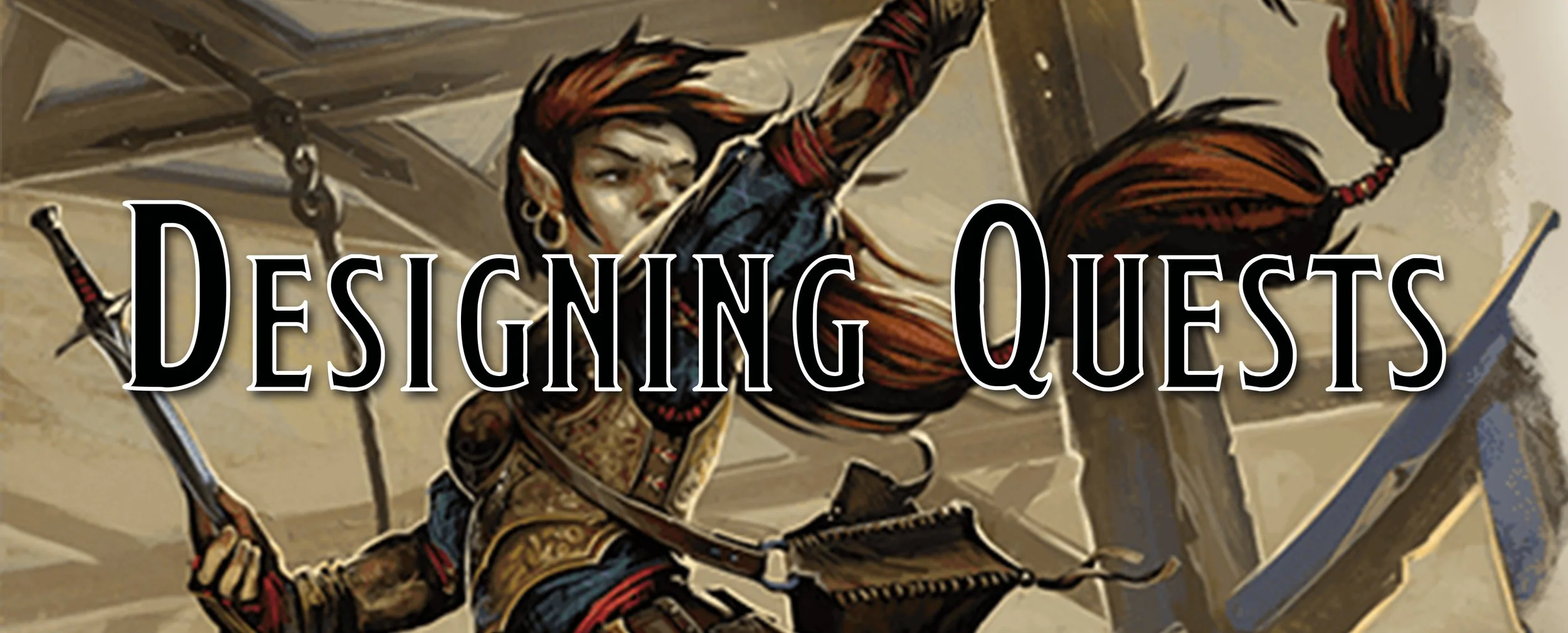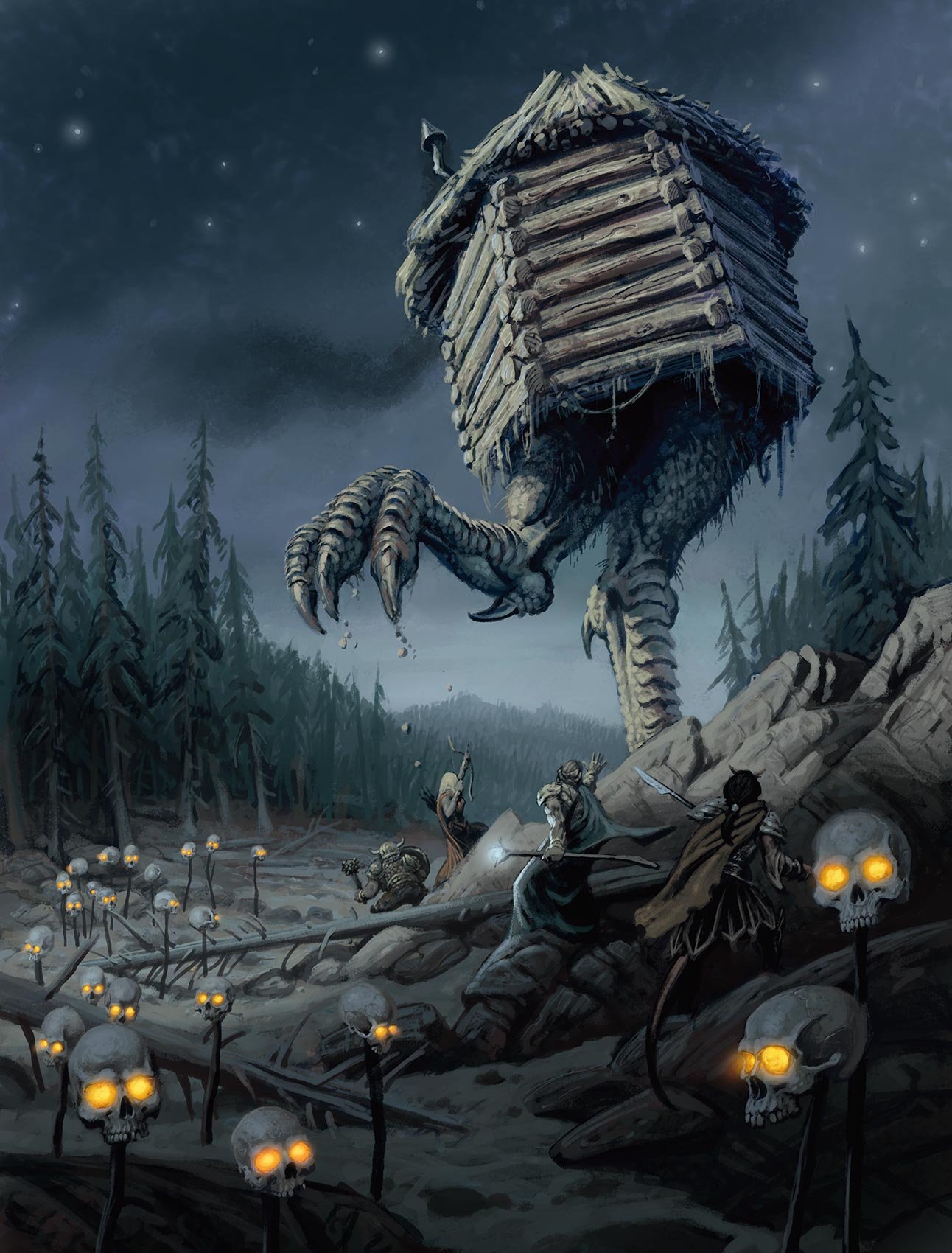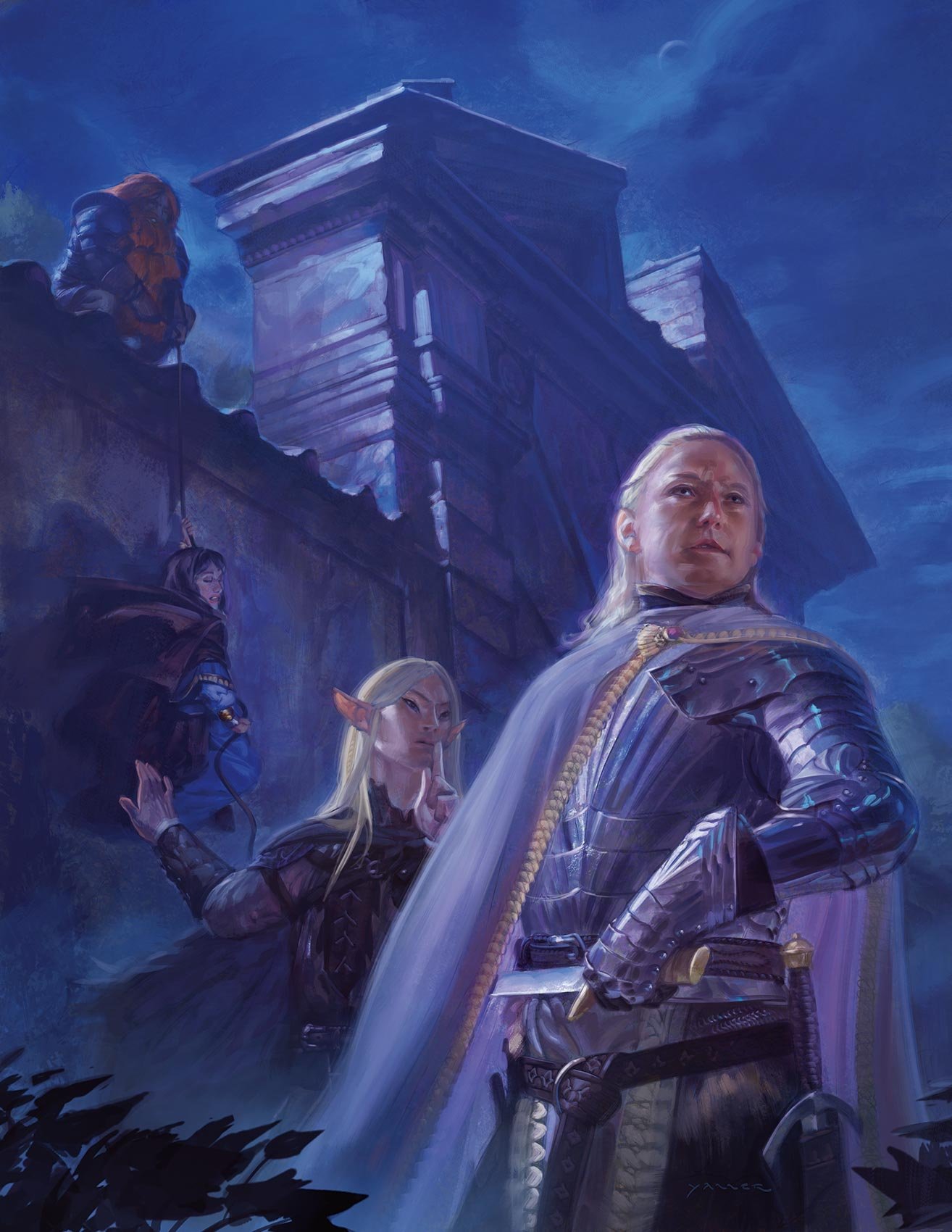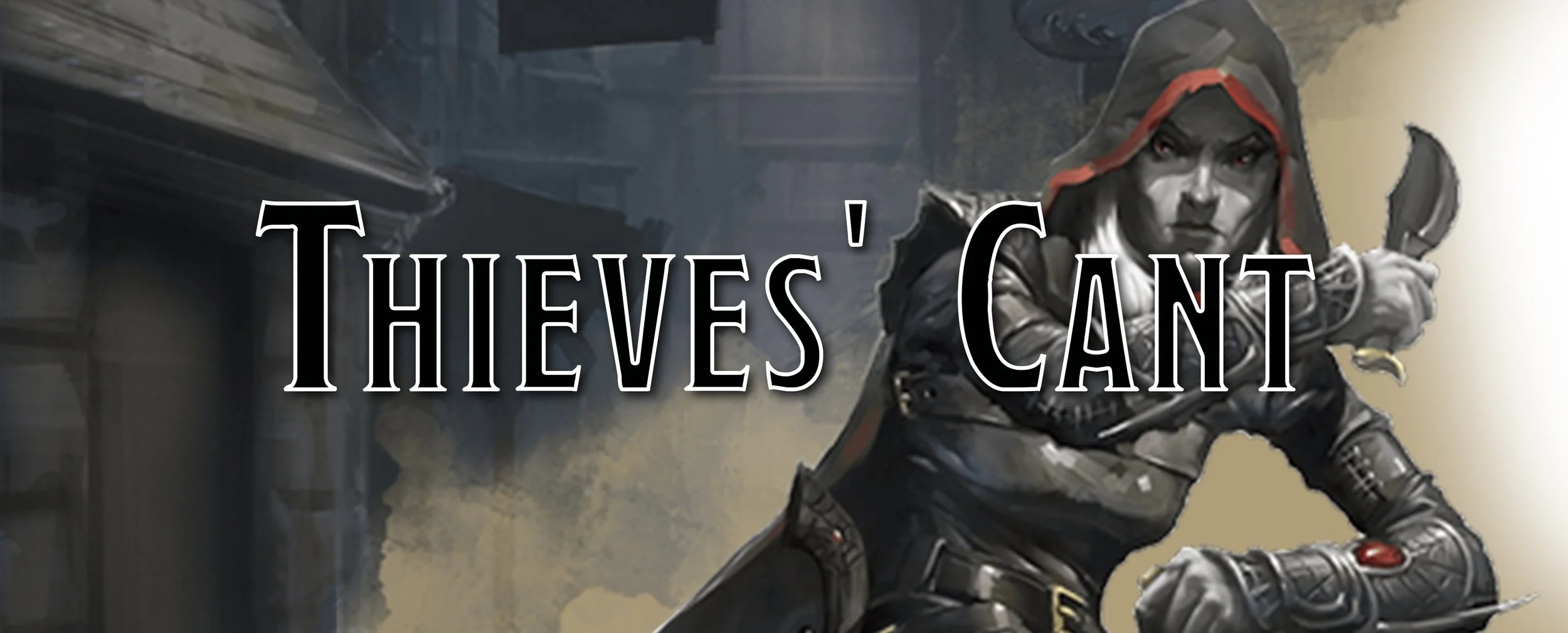Have Quest, Need Adventurers - A Guide for Creating Quests
Header Image: Dungeon Master’s Guide, 2014 Wizards of the Coast
Every adventure begins with a quest. While there is a lot of information out there about how to make adventures, how to run them, what their themes are, and more - there isn’t that much information on quests. Which is strange. For an adventure to begin, thrive, and end - it is made up of quests.
Quests are the building blocks of an adventure, a campaign, and more. Without quests, your players are stuck in their quaint little town, not going on adventures or defeating monsters. This ubiquitous mechanics is the driving force for your players, encouraging them to continue their questionable career choices of adventuring, risking their lives for gold coins, and saving the world.
Dungeon Master’s Guide, 2014 Wizards of the Coast
What are Quests?
Putting it simply, a quest is a difficult task that must be completed. Often in a game, quests are not something that just anyone can complete, but rather requires adventurers to come and deal with the problem. Though, if you throw enough commoners at a problem, they can eventually solve it. Of course, the results won’t be pretty as the mound of dead commoners would be unsightly and probably just a bit smelly.
It’s Not An Adventure?
While adventures can be a series of quests back-to-back, a quest by itself is not an adventure. Instead, a quest is a subplot or a situation that takes place within an adventure, though it doesn’t have to have any influence on the adventure. It can merely be a sidequest, something that doesn’t affect the adventure and just takes part during the adventure, or it can be an important component of the adventure. Quests are not the plot or story, but rather a set of motivation, goals, and payout to propel the players forward.
Motivation
Every quest requires motivation - this is how you get your players to actually engage with the quest and follow it. If the party has no interest, or motivation, to fulfill a quest, it doesn’t get done. It doesn’t matter what you have written or what story you are trying to tell, because if you can’t get your party hooked on the quest, then your adventure isn’t getting done.
This is the main difference between a plot, the overarching story of an adventure, and a quest. A plot, and thus the story, can happen with and without a party’s interference, while a quest requires the party to interfere and be motivated to follow it.
So when creating a quest, you must keep in mind what motivation the party has to complete the quest. If they have none, then the quest will not be taken up while the plot of your story still marches forward without them.
Goal
An important part of getting players excited to take on a quest is often by showing off the goal - though not always. The party could merely be taking on a quest because they get paid, regardless of what the goal is. A quest’s goal should be a very clear objective for the party and is what they need to do to succeed at their quest. A goal can change as the quest unfolds, but the players should always be aware of what the goal is so they know when a quest is a success.
Payout
Quests should feature some sort of payout for the party, whether this is information, gold coins, magic items, access to important people, or anything else. Payouts are often tied to the motivation, but sometimes a quest’s payout may not be enough motivation for the party and you will have to include some other motivation for the party, like a family or friend of the party asking them to complete the quest even if the payout isn’t much.
Types of Quests
Three levels determine how important a quest is to the adventure and the adventuring party as a whole, with the most important being Major Quest, then Minor Quests, and lastly Sidequests.
Major Quests
These quest types are important to everyone in the party and often feature the central goal of an adventure, with the conclusion of the quest being the end of an adventure arc. This quest is typically something large and can’t be solved in a session. Every character should have some link to this quest and is something important to them to ensure that they take up this plot and complete it. Failure to succeed at this quest should have major effects on the party.
A major quest could include: defeating the BBEG, stopping the world from being destroyed, the survival of the players, or some other major event that involves everyone in the party.
Dungeon Master’s Guide, 2014 Wizards of the Coast
Minor Quests
Not every quest has to be equally important to all members of a party, which are where minor quests come in. This quest is important to only a handful in the party, or as few as only one character, and could take place in a session or spread out several sessions. If this quest is completed, the characters who find this quest important should have some sort of payout, like getting a new magic item, finding information that is important to them, or something else that would be of great importance to them.
A minor quest could include: finding a character’s missing parents, locating an important holy text to a cleric’s order, getting revenge against someone who wronged the party or an individual in the party, or some other event that won’t have dire repercussions on the world, but might on a single character or multiple characters (but not everyone in the party).
Sidequests
This is the least important type of quest, but not because it is meaningless or simple. Instead, this type of quest is minor to the party and nobody will see it as important to complete except for the payout they might get at the end. Often these quests are given out by NPCs and are smaller affairs that can be completed in a session or two and are straightforward. The only reason why the party has agreed to do this quest is that they are being rewarded to do so, not from personal motivation or character backstory.
A sidequest could include: finding missing sheep, clearing out a nearby bandit blockade, deal with a sudden blight rising in the forest, clear out the mines of monsters, or other events that require adventurers but the party doesn’t have a personal stake in the quest.
Quest Activities
A quest isn’t a quest until you have a hook or a seed to give your party. This is the introduction to the quest and is the main activity of said quest. These activities can include hunting down monsters, dealing with events, finding locations, making new friends, and more.
Fetch Quests
Probably the most well-known type of quest, and the most derided, though unfairly. A fetch quest typically involves the party having to journey somewhere else and bring back an important item, thirty wolf pelts, or something similar - which is often thought of as busy work in a video game or a way to pad out the game. For TTRPG, this can also be a way to give yourself another session to prep for the main plot, though some players might groan.
I think it is unfairly derided because most quests will often fall into this designation without people complaining about it. For example, you want your party to get a McGuffin so they can win against the BBEG, this is a type of fetch quest where they must travel somewhere, gain an object, and bring it back. The key to using fetch quests though requires you to not call them such and give the party something important to find with a good reward.
Fetch quests shouldn’t be collecting a dozen duck feathers or other minor items, but rather reserved for important items.
Exploration Quests
In these quests, the party must travel to a new location they haven’t been to and then have some activity that involves that location. This could involve clearing a mine, protecting an ancient shrine from blasphemers, sealing off a mummy’s tomb from outsiders, or even escape from this new location that the party found.
These quests work best for weird and strange places with slightly different environmental rules than the party might be used to, like going into the tunnels below the surface, heading to a new plane, or entering into a thick bog.
Social Quests
No matter how hard your party of murderhobos might try, sometimes you will need them to talk to people and make friends, defeat rivals, and more. In these quests, the party will have to negotiate with other creatures they can’t simply kill and use their gift of gab to find success. This might be to get needed information, help in performing a task, settle a debt for themselves or an ally, or even become bodyguards (or assassins) for an NPC.
Event Quests
Sometimes the world misbehaves and a sudden tsunami washes across a town, requiring the party to assist in the aftermath. In these types of quests, a major event has happened that has turned their world on its head and it is up to the party to bring normalcy back to a small or large location or people. This doesn’t have to be a natural disaster, as it could be a social situation where they get arrested or someone mistakes who they are for the worse.
These quests could include playing games at a festival, dealing with devastation in a region from a natural disaster, learning more information about something weird or dangerous infecting the local area, finding information on how to stop a disaster from happening, and other situations that require a lot of skill to solve.
Dungeon Master’s Guide, 2014 Wizards of the Coast
The Dos and Don’ts of Questing
The last topic to cover is what you shouldn’t do when creating quests. While every rule can be broken, and still have good results, the following are just general guidelines to ensure that you and your table have a great time.
When designing a quest, keep it from being repetitive. If your party has already done a fetch quest to find a dozen wolf pelts, it would be boring if they get another quest to collect thirty duck feathers.
Your quests can have twists, but such twists should be telegraphed and clearly explained when they happen. For example, if your party is supposed to find a rare magic item in an ancient tomb, and by the time they reach the item they find out it is missing, there should be something there to not only tell them that it is missing, and a quest hook to find who was responsible. There should also be clues along the way there that they aren’t the first in the tomb - like already smashed skeletons - otherwise it feels odd that someone was able to avoid every encounter or trap and that the GM is just keeping them from getting their shiny magic items.
Provide different quests that involve the same thing, each from a different perspective. This gives the party the chance to pick and choose who they wish to work, how they want to solve a quest, and also provides an easy way to create an adversary and ally for the party. Perhaps the adversary can play a role in a future quest that will trip up the party.
If players latch on to an idea or want to do something, encourage them to follow through on it and create a quest out of their idea. Not only does it mean that that player is going to latch on to that quest, but it helps take off some of the load of coming up with ideas for sidequests and minor quests while they work on completing the major quest you created.
Like what we are doing here?
Support us on Patreon!
You’ll get early access to deep dives, the Homebrew Hoard featuring 500+ monsters, Monster Thursdays, ad-free articles, and more!
Follow us on Twitter to keep up to date on everything we talk about!






